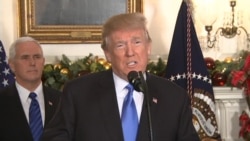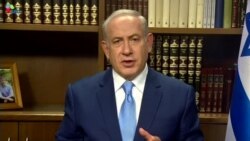ໂດຍກ່າວວ່າ “ຄວາມຫວັງອັນຍິ່ງໃຫຍ່ຂອງພວກເຮົາກໍແມ່ນເພື່ອສັນຕິພາບ” ປະທານາ
ທີບໍດີສະຫະລັດ ທ່ານດໍໂນລ ທຣຳ ໄດ້ຕ່າວປີ້ນນະໂຍບາຍຂອງສະຫະລັດ ທີ່ມີມາຫຼາຍໆ
ທົດສະວັດແລ້ວນັ້ນ ໂດຍຮັບຮູ້ເຈຣູຊາແລັມ ເປັນນະຄອນຫຼວງ ຂອງປະເທດອິສຣາແອລ
ແລະເລີ້ມຂັ້ນຕອນການຍ້າຍສະຖານທູດອາເມຣິກັນ ຈາກນະຄອນ ແທລ ອາວີຟ ໄປຍັງ
ນະຄອນສັກສິດ ມາຕັ້ງແຕ່ບູຮານນະການນັ້ນ.
“ມື້ນີ້ ໃນທີ່ສຸດພວກເຮົາກໍໄດ້ຮັບຮູ້ໃນສິ່ງທີ່ຈະແຈ້ງ ນັ້ນກໍຄືວ່າ ເຈຣູຊາແລັມ ແມ່ນນະ
ຄອນຫຼວງ ຂອງອິສຣາແອລ. ນີ້ບໍ່ມີຫຍັງຫຼາຍ ຫຼືໜ້ອຍກວ່າ ການທີ່ຮັບຮູ້ ເຖິງຄວາມ
ເປັນຈິງ,” ທ່ານທຣຳ ໄດ້ກ່າວເຖິງວັກທີ່ສຳຄັນ ຂອງຖະແຫຼງການ ຂອງທ່ານຈາກຫ້ອງ
ການທູດຂອງທຳນຽບຂາວ.
“ມັນຍັງແມ່ນການກະທຳທີ່ຖືກຕ້ອງ. ມັນແມ່ນສິ່ງທີ່ຕ້ອງໄດ້ເຮັດ. ນັ້ນລະຄືເຫດຜົນ,
ທີ່ສອດຄ່ອງກັບກົດໝາຍ ສະຖານທູດເຈຣູຊາແລັມ, ຂ້າພະເຈົ້າຍັງໄດ້ສັ່ງການ
ໃຫ້ທາງກະຊວງການຕ່າງປະເທດ ເລີ່ມກະກຽມຍ້າຍສະຖານທູດອາເມຣິກັນ
ຈາກນະຄອນເທລວີບ ໄປຍັງເຈຣູຊາແລັມ,” ທ່ານໄດ້ກ່າວ ໃນການໃຫ້ຄຳປາໄສ
ທາງໂທລະພາບ ໄປຍັງທົ່ວໂລກເປັນເວລາ 11 ນາທີ.
ເຊີນຊົມ: ທ່ານທຣຳ ຖະແຫຼງ ໃຫ້ເຫດຜົນ ຂອງການຕັດສິນໃຈ
ເຖິງຢ່າງໃດກໍຕາມ ປະທານາທິບໍດີ ໄດ້ກ່າວວ່າການຍົກຍ້າຍທີ່ວ່ານີ້ “ບໍ່ໄດ້ມີຈຸດປະສົງ
ໃນທາງໃດທາງນຶ່ງ ທີ່ຈະສະທ້ອນເຖິງ ການຫັນເຫໄປຈາກຄວາມໝັ້ນໝາຍທີ່ແຂງ
ແກ່ນຂອງພວກເຮົາ ເພື່ອທີ່ຈະຊ່ວຍໄກ່ເກ່ຍຂໍ້ຕົກລົງສັນຕິພາບອັນຖາວອນນັ້ນ.”
ທ່ານທຣຳ ໄດ້ກ່າວເພີ່ມຕື່ມວ່າ “ພວກເຮົາບໍ່ໄດ້ເອົາທ່າທີໃດໆ ກ່ຽວກັບຖານະຂັ້ນສຸດ
ທ້າຍ ທີ່ຮວມທັງເຂດແດນອັນແທ້ຈິງ ຂອງອະທິປະໄຕອິສຣາແອລ ໃນນະຄອນ
ເຈຣູຊາແລັມຫຼືການຕົກລົງກັນຂອງຊາຍແດນທີ່ຍັງເປັນບັນຫາຂັດແຍ້ງນັ້ນ. ຄຳຖາມເຫລົ່ານັ້ນ ແມ່ນຂຶ້ນຢູ່ກັບວ່າ ແມ່ນຂຶ້ນຢູ່ກັບພັກຝ່າຍກ່ຽວຂ້ອງພົວພັນນຳ.”
ປະທານາທິບໍດີ ໄດ້ຮຽກຮ້ອງໃຫ້ທຸກພັກຝ່າຍ “ຮັກສາສະພາບທີ່ເປັນຢູ່ໃນປັດຈຸບັນ
ຂອງສະຖານສັກສິດຕ່າງໆ ໃນນະຄອນເຈຣູຊາແລັມ ຮວມທັງວັດແທມເປີລເມົ້າທຼ
ແລະຮູ້ກັນໃນອີກຊື່ນຶ່ງວ່າ ຮາຣາມ ອາລ ຊາຣິຟ. ເໜືອກວ່າສິ່ງອື່ນໃດທັງໝົດ ຄວາມຫວັງຂອງພວກເຮົາກໍແມ່ນເພື່ອສັນຕິພາບ, ຊຶ່ງເປັນສິ່ງທີ່ໄຝ່ຝັນຫາຂອງ
ມະນຸດເຮົາທຸກໆຄົນ.”
ນາຍົກລັດຖະມົນຕີອິສຣາແອລ ທ່ານເບັນຈະມິນ ເນຕັນຢາຮູ ເອີ້ນການຕັດສິນໃຈນີ້ວ່າ
“ມີຄວາມສຳຄັນປະຫັວດສາດ.” ໃນວີດີໂອທາງແຟສບຸກ ທ່ານເນຕັນຢາຮູ ໄດ້ກ່າວວ່າ
“ປະຫວັດສາດແລະເອກກະລັກແຫ່ງຊາດຂອງ ອິສຣາແອລນັ້ນ ແມ່ນໄດ້ຮັບ
ການສະແດງອອກອັນສຳຄັນ ໃນທຸກໆລະມື້, ແຕ່ ມີຄວາມສຳຄັນເປັນພິເສດໃນມື້ນີ້.”
ເຊີນຊົມ: ທ່ານເນຕັນຢາຮູ ກ່າວຂອບໃຈ ຕໍ່ທ່ານທຣຳ
Saying "our greatest hope is for peace," President Donald Trump has reversed decades of U.S. policy, recognizing Jerusalem as Israel's capital and setting in motion the process of moving the American embassy from Tel Aviv to the ancient holy city.
"Today, we finally acknowledge the obvious: that Jerusalem is Israel's capital. This is nothing more or less than a recognition of reality," Trump said in a highly anticipated speech from the White House Diplomatic Room.
"It is also the right thing to do. It's something that has to be done. That is why, consistent with the Jerusalem Embassy Act, I am also directing the State Department to begin preparation to move the American embassy from Tel Aviv to Jerusalem," he said in the internationally televised 11-minute speech.
However, the president said, the move "is not intended in any way to reflect a departure from our strong commitment to facilitate a lasting peace agreement."
Trump added, "We are not taking a position of any final status issues, including the specific boundaries of the Israeli sovereignty in Jerusalem, or the resolution of contested borders. Those questions are up to the parties involved."
The president called on all sides to "maintain the status quo at Jerusalem's holy sites, including the Temple Mount, also known as Haram al-Sharif. Above all, our greatest hope is for peace, the universal yearning in every human soul."
Israeli Prime Minister Benjamin Netanyahu called the decision a "historic landmark." In a Facebook video, Netanyahu said Israel's "historical and national identity is receiving important expressions every day, but especially today."
But Palestinian President Mahmoud Abbas said Trump's plan is tantamount to the United States abdicating it's role as a peace mediator. Hamas chief Ismail Haniyeh said, "Our Palestinian people everywhere will not allow this conspiracy to pass, and their options are open in defending their land and their sacred places."
The Palestinians also sent a letter asking the United Nations Security Council to reaffirm its legal position on the status of Jerusalem.
"We thus call on the Security Council to act urgently to avert the further destabilization of this extremely volatile situation, which poses a threat to international peace and security," the letter said.
World react
Word of the decision has roiled the Arab world, raising the prospect of violence.
Even some of Washington's allies in the region and elsewhere voiced grave concerns about the shift in U.S. policy.
Al-Jazeera television quoted Qatar's foreign minister, Sheikh Sabah Al-Khaled Al-Hamad Al-Sabah, as saying the embassy move would be a "dangerous escalation and death sentence for all who seek peace."
Turkish President Recep Tayyip Erdogan and Jordan's King Abdullah, meeting in Ankara Wednesday, called for an emergency meeting of the 57-member Organization of Islamic Cooperation.
Moving the U.S. embassy would "dynamite the ground for peace, igniting new tensions and clashes," Erdogan said. He has threatened to break ties with Israel if Trump recognizes Jerusalem as its capital.
King Abdullah, underlining Jordan's role as guardian of Muslim and Christian sites in Jerusalem, said ignoring the Palestinians and Christian rights in Jerusalem "would only fuel further extremism."
"It is imperative now to work fast to reach a final status solution and a peace agreement between Palestinians and Israelis, and this must allow the Palestinians to establish their independent state side-by-side with Israel and its capital in East Jerusalem," Abdullah said.
Pope Francis issued a statement calling for the status quo for Jerusalem and urging "wisdom and prudence" to avoid bloodshed.
U.S. political impact
The announcement follows Trump's campaign pledges to move the embassy to Jerusalem, a proposal backed by some of his Jewish and evangelical Christian supporters.
Aaron David Miller, who has served as a Middle East adviser to both Republican and Democratic presidents, expressed puzzlement at the timing of the decision. Speaking to VOA, Miller said it is hard to see the political benefits for Trump or the United States. "I can identify not a single U.S. national interest that is served, and serious downsides that are incurred by this move to relocate the embassy."
Miller, now a vice-president at the Woodrow Wilson International Center for Scholars in Washington, said Trump's decision is a textbook example of how to provoke fury in the Arab and Muslim world.
"It's fair to say that if you wanted to create an issue in a laboratory that was designed to motivate violence, to play to passions, hatred and anger, Jerusalem would be the issue," Miller told VOA.
Dalia Dassa Kaye, director of the Rand Corporation's Center for Middle East Public Policy, told VOA it should come as no surprise that Trump's decision would be broadly condemned. "Once again the United States is isolated globally with no clear strategic gain," she said. "And it risks inflaming regional tension and increasing anti-American sentiment. The result is a boon for extremist forces and countries like Iran unfortunately."
Embassy move logistics, security
Trump gave few details of the embassy move, saying only that architects were being directed to make the facility "a magnificent tribute to peace." But officials have said it would likely take years to build.
Under a law signed by President Bill Clinton in 1995, the embassy must be relocated to Jerusalem unless the president signs a waiver every six months stating that moving the embassy would threaten U.S. national security. Every president since Clinton has signed the waiver, including Trump, who signed another extension Wednesday.
Given the potential for a violent backlash against Israel and American interests in the region, the U.S. Consulate General is restricting American government workers and their families from personal travel in Jerusalem's Old City and West Bank, including Bethlehem and Jericho, amid widespread calls for demonstrations.
In a statement following Trump's announcement, Secretary of State Rex Tillerson said the safety of Americans is the State Department's highest priority.
"And in concert with other federal agencies, we've implemented robust security plans to protect the safety of Americans in affected regions," he said.
Jerusalem is home to the Mosque of Al Aqsa, the third holiest place in Islam. For Jews, it is the Temple Mount, the holiest site of all. It is also the site of several important Christian sacred places.












